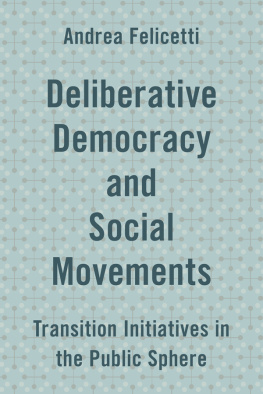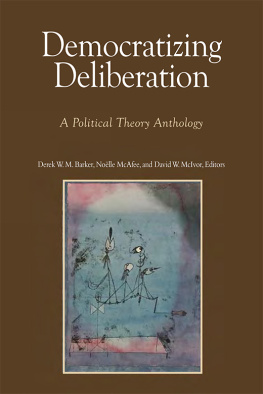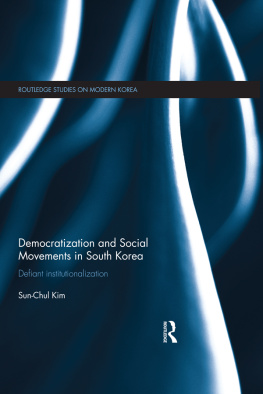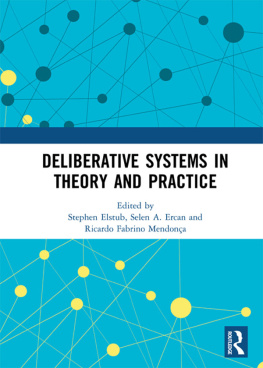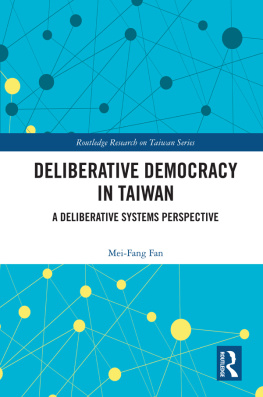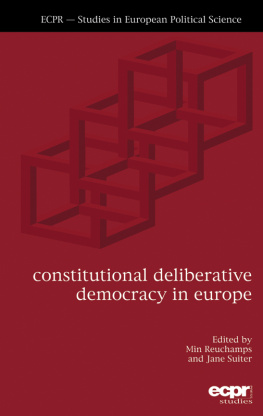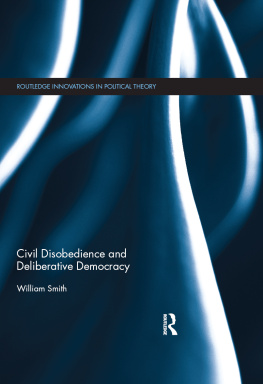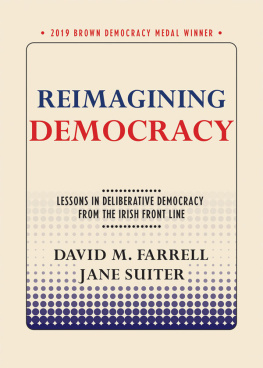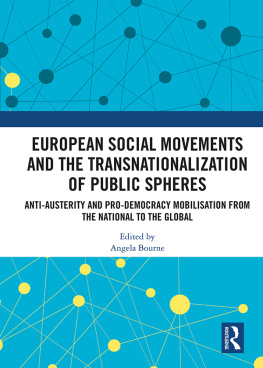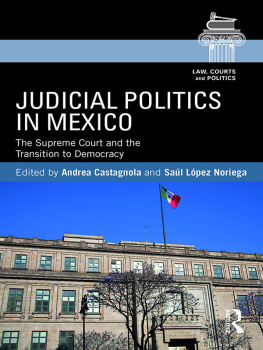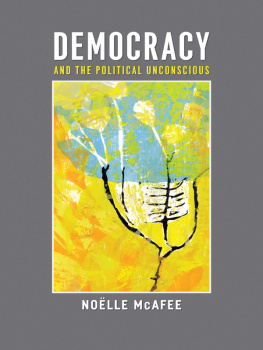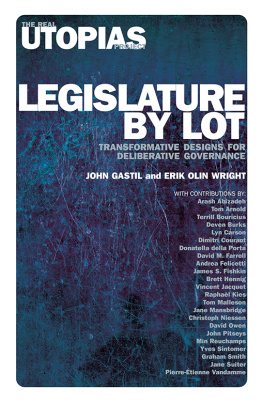Published by Rowman & Littlefield International Ltd
Unit A, Whitacre Mews, 26-34 Stannary Street, London SE11 4AB
www.rowmaninternational.com
Rowman & Littlefield International Ltd. is an affiliate of Rowman & Littlefield
4501 Forbes Boulevard, Suite 200, Lanham, Maryland 20706, USA
With additional offices in Boulder, New York, Toronto (Canada), and Plymouth (UK)
www.rowman.com
Copyright 2017 by Andrea Felicetti
All rights reserved. No part of this book may be reproduced in any form or by any electronic or mechanical means, including information storage and retrieval systems, without written permission from the publisher, except by a reviewer who may quote passages in a review.
British Library Cataloguing in Publication Data
A catalogue record for this book is available from the British Library
ISBN: HB 978-1-7866-0164-3
PB 978-1-7866-0165-0
Library of Congress Cataloging-in-Publication Data Available
ISBN 978-1-78660-164-3 (cloth: alk. paper)
ISBN 978-1-78660-166-7 (electronic)

The paper used in this publication meets the minimum requirements of American National Standard for Information SciencesPermanence of Paper for Printed Library Materials, ANSI/NISO Z39.48-1992.
Printed in the United States of America
This book is based on my PhD dissertation and on further refinements I made afterwards. Just like many others, this work would not have taken shape without the help and the work of countless people. They made it possible for me to start and finish my PhD and to continue working on this volume for quite a while afterwards. My family and friends deserve a special mention, particularly my parents: Giannino and Gisella. Thank you.
I am thankful to the people I met in the long journey from Canberra, at the Centre for Deliberative Democracy and Global Governance, where I started this work, to Florence, at the Center on Social Movement Studies, where I finalised it. I am particularly grateful for the beautiful reception I have had in the communities I visited in Tasmania, Queensland, Emilia Romagna, and Sicily. I have also greatly benefitted from the many scholars I engaged with whilst developing my research across Europe and Australia. My visits to University of Warwick and Bologna University have offered me a great opportunity to focus on this research. Also, I really appreciated the great work of the editorial team at Rowman & Littlefield International.
I am most indebted to John Dryzek and Donatella della Porta for their patient and always very kind guidance. Sasha Lipton Galbraith has not only provided me with precious help in writing this book, she has also been my greatest source of support and joy.
The author and publisher wish to thank Policy Studies for permission to reproduce excerpts from copyrighted material in the following publication: Felicetti, Andrea. Localism and the Transition Movement. Policy Studies. Vol. 34, Nos. 56, (2013): 559574.
Citizen deliberation is a fundamental concern for deliberative theories of democracy. Early deliberative theorists tied the prospects for a democratic society to the possibility of realising democratic deliberation within publics at large, not just institutions. Nonetheless, circumscribed citizens or representatives assemblies have often been identified as the very loci where democratic deliberation could be pursued. On the other hand, with the exception of some key works, the possibility of deliberation within the public sphere has received less attention. The empirical investigation of the deliberative and democratic qualities in the public sphere remains necessary, as well as an understanding of what aspects may hinder or foster quality discursive engagement. The increasingly advocated systemic approach to deliberative democracy calls for a refined understanding of organisations in the public sphere.
This study provides an investigation of the qualities of citizens engagement from a deliberative democratic standpoint. The key concept through which such qualities are investigated is deliberative capacity, which is seen in terms of the extent to which organisations host authentic, inclusive, and consequential discursive processes. This work, in particular, is based on a comparative study of four grassroots local initiatives, two from Australia (in Tasmania and Queensland) and two from Italy (in Emilia-Romagna and Sicily). The case studies under examination are associated with Transition, a contemporary movement fighting peak oil and resource depletion through the development of community-level activism. This volume has three objectives: refining the idea of deliberative capacity to make it suitable for assessing the deliberative qualities of social movement organisations, understanding the variation of deliberative capacity across the case studies, identifying the overarching dynamics affecting the deliberative capacity of social movement organisations.
In the initial part, this work discusses the idea of deliberative capacity in light of the wider debates in the field and adapts this concept to suit the empirical investigation of organisations in the public space. Next, the interpretive and qualitative research methodology and relevant literature are presented. Social movement scholarship emerges as the area which has most closely investigated the issues under examination in this work and therefore it receives particular attention throughout the text. The Transition movement is then introduced. After presenting the main features of the movement, Transition is examined through social movement literature and framed within deliberative democratic theory. Four case studies are thus developed. Each of them provides an in-depth understanding and an assessment of the discursive processes characterising the various activities taking place. The ensuing comparative analysis sheds light on the overall deliberative and democratic qualities of these organisations and the way in which deliberative capacity was developed. This research shows that the deliberative and democratic qualities of community-based organisations vary significantly, from particularly problematic to satisfying. The main dynamics accounting for the development of deliberative capacity are found in the interaction between two sets of aspects: the organisations internal features and the context surrounding them. However, whilst the extent to which local contexts foster or hinder the deliberative capacity of social movement organisations is certainly significant, the internal characteristics of groups are the most important determinant of their ability to achieve deliberative democratic engagement.
This book is divided into three sections. The first section includes chapters 1 and 2. It establishes the background and provides the foundations for the study. Section two, chapters 3 to 6, presents the case studies. The third section, chapters 7 and 8 and the conclusions, is dedicated to a comparative analysis and concluding remarks.
The first two chapters deal respectively with: the idea of deliberative capacity, methodology and relevant scholarship; and the Transition movement as an object of deliberative democratic investigation. As already mentioned, deliberative capacity (Dryzek, 2009; 2010a) is the means through which this research conceptualises deliberative and democratic qualities. Chapter 1 discusses this concept in detail, focusing upon the different criteria underpinning each of the three dimensions in which deliberative capacity is articulated (authenticity, inclusivity, and consequentiality), and the way in which it may be usefully adopted in empirical research. The chapter then presents the methodology of this study and justifies it in the light of wider methodological debates, with particular attention to recent developments within research on deliberative democracy. As illustrated, the interpretive methodology used in this work has a more descriptive orientation in the case studies. On the other hand, the comparative analysis investigates the determinants of deliberative capacity to explain how the observed deliberative and democratic qualities are developed (see: Neblo, 2005, Bevir and Ansari, 2012). The final part of the chapter introduces the main works that this research engages with. As explained, this work is grounded in deliberative democratic scholarship yet it engages deeply with work from social movement studies. Chapter 2 introduces Transition from three different standpoints. First, some core features of the movement are presented. Second, Transition and its particular characteristics are investigated through the lens of social movement theories. The concluding section of the chapter argues that researching the deliberative capacity of organisations associated with a movement like Transition is an important undertaking from a deliberative democratic perspective.

 The paper used in this publication meets the minimum requirements of American National Standard for Information SciencesPermanence of Paper for Printed Library Materials, ANSI/NISO Z39.48-1992.
The paper used in this publication meets the minimum requirements of American National Standard for Information SciencesPermanence of Paper for Printed Library Materials, ANSI/NISO Z39.48-1992.
